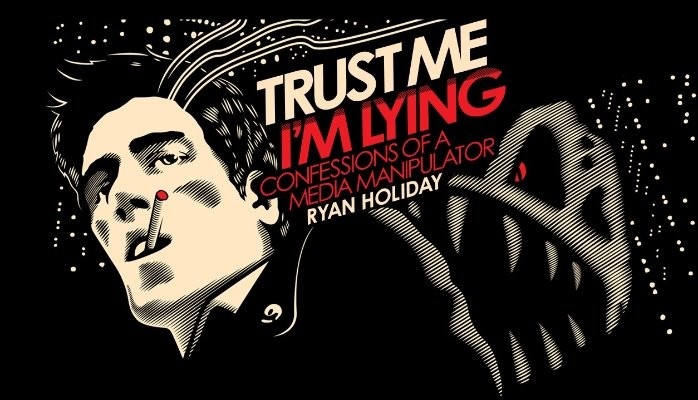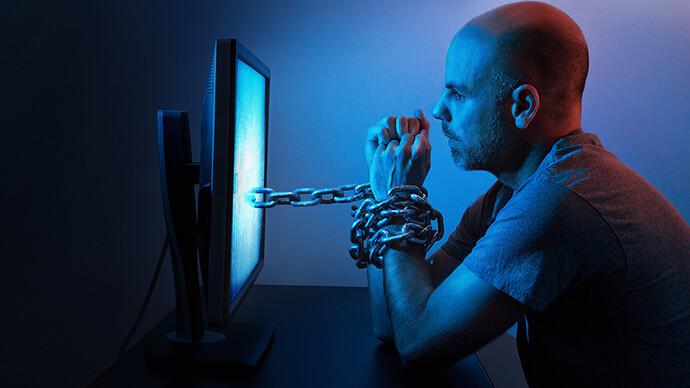Ryan Holiday’s book serves as an eye-opening exposé of media manipulation
In his critically acclaimed book, “Trust Me, I’m Lying,” Ryan Holiday takes readers on a captivating journey into the deceptive and manipulative world of modern media. With an insider’s perspective, Holiday exposes the dark underbelly of digital journalism, revealing the intricate web of lies, clickbait, and sensationalism that dominate today’s information landscape. As we delve into this article, we will explore the power dynamics at play, the consequences of media manipulation, and the ethical implications faced by journalists and consumers alike. Brace yourself for a thought-provoking exploration of how media influences our perception and how we can navigate this landscape to become more informed and discerning consumers of news.
Exploring Ryan Holiday’s Background and Motivations
Ryan Holiday is not your typical media guru. With a mischievous smile and a knack for exposing the inner workings of the industry, he has become a leading voice in the realm of media manipulation. In his book, “Trust Me, I’m Lying: Confessions of a Media Manipulator,” Holiday unveils the dark underbelly of the media world, exposing the tactics used by bloggers, journalists, and PR professionals to control and manipulate the news.
But who is this Ryan Holiday? Well, he’s not a bigshot editor or a media mogul. Instead, Holiday started his career as a young marketer, working for the likes of American Apparel and Tucker Max. It was during this time that he became intimately acquainted with the behind-the-scenes machinations of the media landscape. And he wasn’t just an observer; he actively participated in the deceit, spreading false rumors and manipulating journalists to promote his clients’ interests.
So why did Holiday decide to blow the whistle on his own industry? One can speculate that his conscience got the better of him, or perhaps he simply got tired of playing dirty. Whatever the reason, his book provides a hush-hush look into the world of media manipulation and raises important questions about the integrity of our news sources.
Trust Me, I’m Lying Illustrates the Influence and Power of Media
We live in an era of information overload, where news travels at lightning speed and attention spans are shorter than ever. In this chaotic landscape, the media plays a pivotal role in shaping public opinion and influencing our thoughts, beliefs, and actions. Whether it’s through television, newspapers, or online platforms, the media has an undeniable power to sway our perceptions and shape our understanding of the world.
The Role of Media in Shaping Public Opinion
Ryan Holiday’s “Trust Me, I’m Lying” highlights the fact that the media is not an unbiased, objective source of information. Instead, it is a battleground for competing interests, where manipulation and deceit run rampant. Media outlets are driven by the need for clicks, views, and eyeballs, which often leads to sensationalism, favoritism, and distortion of the truth.
The book sheds light on how public opinion can be easily swayed by those who know how to play the media game. From PR stunts to fake news, from strategically placed leaks to manufactured controversies, the media is constantly under siege by manipulators who are all too eager to exploit its vulnerabilities.
Unveiling the Dark Side of Digital Journalism
The Rise of Digital Journalism and its Impact
With the advent of the internet, the media landscape has undergone a radical transformation. Traditional journalism has taken a backseat, making way for a new breed of digital journalists and bloggers who are hungry for page views and advertising revenue. This shift has not only democratized the media but has also opened the floodgates for rampant manipulation and deception.
Holiday’s book delves into the rise of digital journalism and its impact on the media ecosystem. He exposes the ever-escalating race for attention, where stories are often sacrificed on the altar of virality and clicks. With the pressure to produce content quickly and keep audiences engaged, journalists resort to lazily relying on sensationalism, exaggeration, and outright fabrication, all in the name of generating traffic and ad revenue.
Unethical Practices in Digital Journalism
The digital era has given birth to a slew of unethical practices in journalism. “Trust Me, I’m Lying” uncovers the dirty tricks employed by media manipulators, from planting stories and anonymous tips to creating fake social media accounts and stirring up controversies. These tactics not only deceive the public but also erode trust in the media as a whole.
Holiday’s book serves as a wake-up call, urging readers to be critical consumers of the news and to question the motives behind the stories they encounter online. It is a call to arms against the rampant manipulation and deceit that has infiltrated the world of digital journalism.
Trust Me, I’m Lying – A Guide to Media Manipulation
Deconstructing the Strategies Used by Media Manipulators
In “Trust Me, I’m Lying,” Ryan Holiday takes us behind the scenes of media manipulations, dissecting the strategies employed by those seeking to control the narrative. From planting false stories to leveraging the echo chamber effect, Holiday reveals the tricks of the trade that enable manipulators to shape public opinion and advance their own agendas.
The Importance of Sensationalism and Virality
One of the key insights from Holiday’s book is the integral role that sensationalism and virality play in media manipulations. In a world where attention is the ultimate currency, media manipulators often resort to sensational and controversial stories to grab the public’s attention. By playing on our emotions and exploiting our desire for thrilling narratives, they ensure their messages go viral, spreading like wildfire across social media platforms.
By understanding the anatomy of media manipulations, readers can become more discerning and immune to the tricks employed by those who seek to deceive them. “Trust Me, I’m Lying” serves as a guide to navigating the treacherous waters of modern media and empowers readers to question the information they consume. Through Holiday’s witty and candid writing style, the book manages to both inform and entertain, leaving readers with a newfound skepticism and a desire for truth in an era dominated by manipulation.
The Power of Clickbait and Sensationalism
The Psychology Behind Clickbait
In Trust Me, I’m Lying Holiday describes his use of clickbait, that irresistible temptation lurking in our newsfeeds, plays on our inherent curiosity and fear of missing out. It taps into our brain’s reward system, enticing us to click with promising headlines that rarely deliver on their grandiose claims. We fall for it time and time again, drawn like moths to a flame, only to realize that we’ve been duped. But hey, at least we got a temporary dopamine hit, right?
How Sensationalism Impacts News Consumption
Sensationalism is the lifeblood of modern news media. It’s like the flashy celebrity, hogging the limelight and overshadowing the more nuanced, important stories. Sensational headlines and exaggerated narratives captivate our attention, leaving us addicted to the drama and craving more. Unfortunately, this obsession with sensationalism often comes at the expense of quality journalism and the pursuit of truth.
The Consequences of Fake News and Misinformation
The Spread and Impact of Fake News
Trust Me, I’m Lying illustrates the power of fake news, once confined to the dark corners of the internet, has now become a rampant phenomenon. It spreads like wildfire, fueled by our own biases and the power of social media algorithms. False information can sway elections, damage reputations, and even incite violence. In a world where trust is fragile, the consequences of fake news can be far-reaching and devastating.
How Misinformation Affects Society and Democracy
Misinformation is the sneaky little brother of fake news, wreaking havoc on society and democracy. It creates confusion, polarizes communities, and erodes our ability to have meaningful conversations. When truth becomes a matter of convenience, democracy suffers. Misinformation thrives when we choose to believe what aligns with our preconceived notions rather than seeking factual accuracy. The stakes couldn’t be higher.
Trust Me, I’m Lying – Reflections on the Lack of Ethics of Modern Journalism
Ethical Dilemmas Faced by Journalists Today
Modern journalists face a whole new set of ethical challenges. They grapple with the pressure to generate clicks and maintain relevance in a saturated media landscape. The pursuit of truth often takes a backseat to sensationalism, leading to compromised integrity and questionable reporting practices. It’s a tough balancing act, but one that requires conscious decision-making to preserve the credibility of journalism.
The Need for Transparency and Accountability
Transparency and accountability are like the Batman and Robin of ethical journalism. They go hand in hand, working together to combat the rampant spread of misinformation and restore trust in the media. Journalists and news organizations must be open about their sources, biases, and methods. When we demand honesty and hold them accountable, we create a positive shift towards a more ethical media landscape.
Navigating the Media Landscape: Towards a More Informed Audience
Tips for Recognizing and Avoiding Media Manipulation
In a world of clickbait and fake news, we need to sharpen our media literacy skills. We must question everything, verify sources, and seek multiple perspectives. If a headline sounds too good to be true, it probably is. By not taking everything at face value, we can become active participants in our own media consumption and avoid falling prey to manipulation.
- Verify the source (is it credible?)
- Checkout the author (are they credible)
- Check other sources(trust but verify)
- Maintain a critical mindset(alwa)ys)
- Check and recheck the facts(due diligence)
- Check the comments (should at least be fun…)
- Review your own biases (are you in an Echo Chamber?)
- Check whether it’s a joke (lots of fake News Starts as a Joke)
- Check images are authentic(especially in the AI age)
- Use a fact-checking site (snopes.com, factcheck.org)
The Role of Media Literacy in Building an Informed Society
Media literacy is the superhero we desperately need in our society. By educating ourselves and others about media bias, fact-checking, and critical thinking, we can build a more informed and discerning audience. Teaching media literacy in schools and promoting it as a life skill is crucial for dismantling the echo chambers and creating a society that values truth over sensationalism.
Remember, folks, the media landscape may be a wild and treacherous place, but with a healthy dose of skepticism and a commitment to truth, we can navigate it like seasoned adventurers. Trust me, I’ve seen it all, and this is one journey you don’t want to miss!
As we continue to explore of Ryan Holiday’s “Trust Me, I’m Lying,” it becomes evident that the media landscape is not as transparent and reliable as it may seem. The prevalence of sensationalism, clickbait, and misinformation poses a significant challenge to our ability to stay informed and make well-informed decisions. It is crucial for both journalists and consumers to reflect on the ethical implications of their actions and to strive for greater transparency, accountability, and media literacy. By being vigilant, critical thinkers, we can navigate the media landscape with caution and contribute to a more informed and empowered society.





